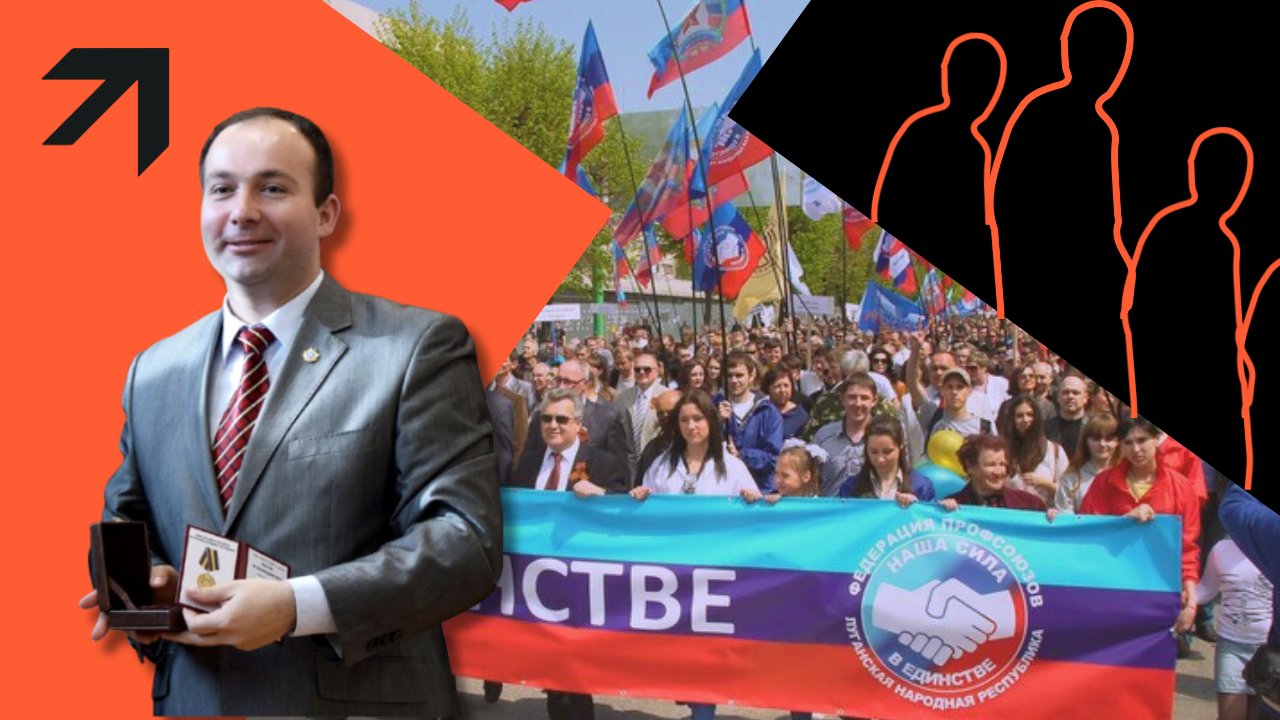

Luhansk collaborator Oleh Akimov and the FSB’s cultural landing in Melitopol. How Russia engages proven personnel to work with “new regions”
Luhansk collaborator Oleh Akimov has recently become the star of cultural events in the occupied part of the Zaporizhzhia region. Farvater.Skhid found out how the Luhansk “republic” “personnel reserve” appeared in Zaporizhzhia and who and why patronises Luhansk propagandists.
Since the beginning of the war in 2014, Oleh Akimov has been the head of the so-called federation of trade unions of the Luhansk “republic”. After six years of cooperation with the occupation administration, Akimov, a former deputy of the Luhansk regional council from the Party of Regions and head of the local party youth organisation, disappeared from the media.
Some explained this as another wave of political cleansing, while others attributed to Akimov a dizzying career promotion in Moscow. Later, Farvater.Skhid found traces of Akimov in St Petersburg in a trade union position far from “big politics”. The full-scale Russian aggression opened a new window of opportunity for the ex-Party of Regions functionary and a team of other collaborators. In a new place, but in the old role.
Why there is so much media coverage of a Luhansk collaborator in the occupied part of the Zaporizhzhia region
On New Year’s Eve, Oleh Akimov, deputy chairman of the all-Russian trade union Sotsprof, found himself in a dungeon. At a depth of 840 metres in the underground chapel of the Dneprorudninsky Iron Ore Plant in the Zaporizhzhya region, he took part in a prayer service for the health of miners.
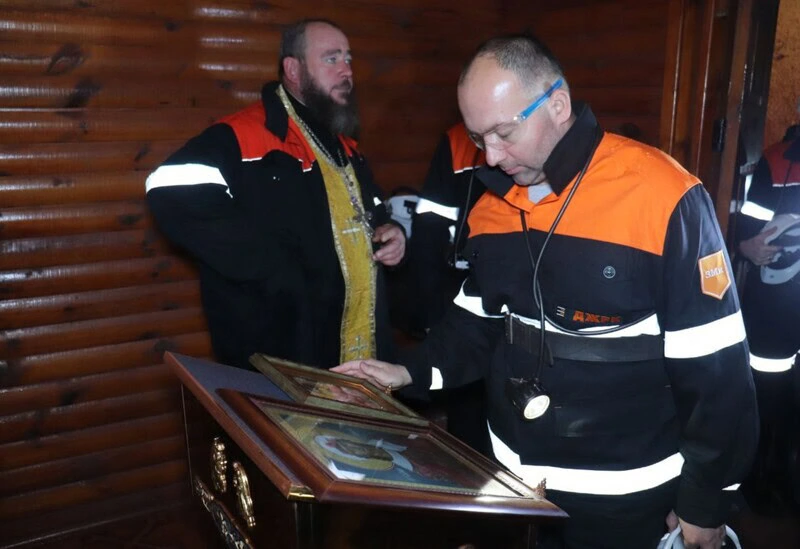
On New Year’s Eve, Akimov prayed underground for the health of miners. Photo: Sotsprof
Before that, he co-founded the Zaporizhzhia Region Figure Skating Federation, which is another platform for Russian propaganda in Melitopol.
Earlier, Oleh Akimov took part in the opening of the Zaporizhzhia branch of the Assembly of Peoples of Russia, but as the leader of the interregional NGO Union of the Luhansk Region Hometown Communities.
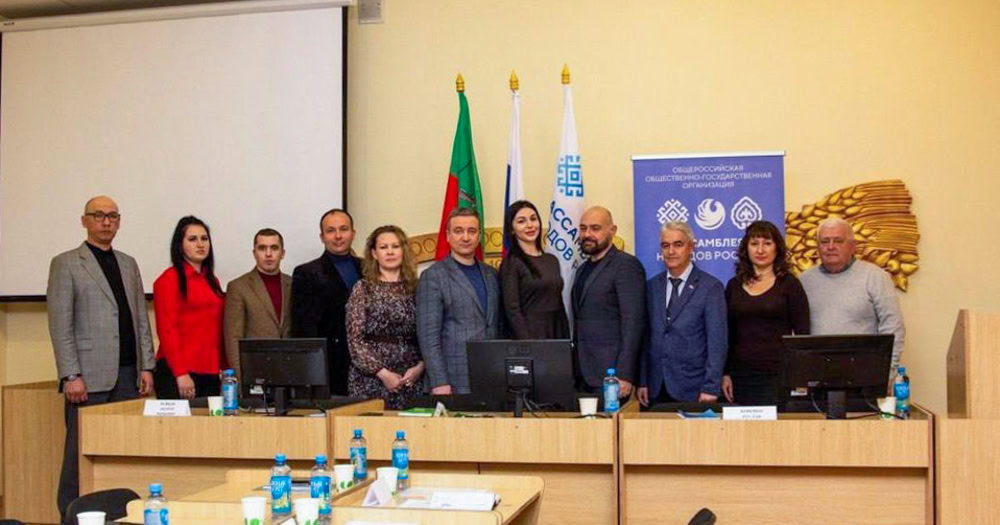
Akimov (fourth left) at the opening of the Zaporizhzhia branch of the Assembly of Peoples of Russia. Photo: All-Russian Public State Organisation Assembly of the Peoples of Russia
It seems that the Luhansk resident in the occupied south of Ukraine is involved in almost all spheres of life. Together with the occupation trade unions in Kherson, he rejoiced in 2022 at the integration with Russia, revived the literary movement in Melitopol in 2023, greeted colleagues from Italy from the pages of Russian media in Zaporizhzhia in 2024, and even celebrated St Nicholas Day with local churchmen.
In most of these various “integration” events, activists from Luhansk and Crimea participate alongside Akimov. These people can hardly be considered indigenous Zaporizhzhia region inhabitants.
After 2022, there was a certain personnel vacuum in the newly occupied territories, says Igor Akimov, director of the social engineering agency Sociolab, citing the opinion of representatives of the Ukrainian special services. The Russians’ hopes for popular support have not been realised, and the Kremlin political technologists are trying to fill this vacuum with fully controlled “talking heads” to form a new mass consciousness.
“Collaborators brought in from the ‘people’s republics’ of Donbas are ideal for this role: they have already passed this school and have the relevant skills, established contacts with Russians, an understanding of the local context and the general line of Russian propaganda,” says Igor Akimov.
The sociologist recalls that the same thing happened in 2014, when an experienced “personnel reserve”, trained by Russians in Crimea, came to Luhansk to “make a revolution”: Yuriy Pershikov, Serhiy Meshkovoy, Kostiantyn Knyrik, etc.
“Let’s take a photo against the background of the orbit”
After being “relocated” from Luhansk in 2020, Oleh Akimov got a job as deputy head of an interesting organisation – the Association of Trade Unions of Russia Sotsprof. Akimov has worked with this organisation before. In 2019, as the boss of the “federation of trade unions” of the Luhansk “republic”, he signed an agreement on cooperation with the head of Sotsprof, Sergey Vostretsov.
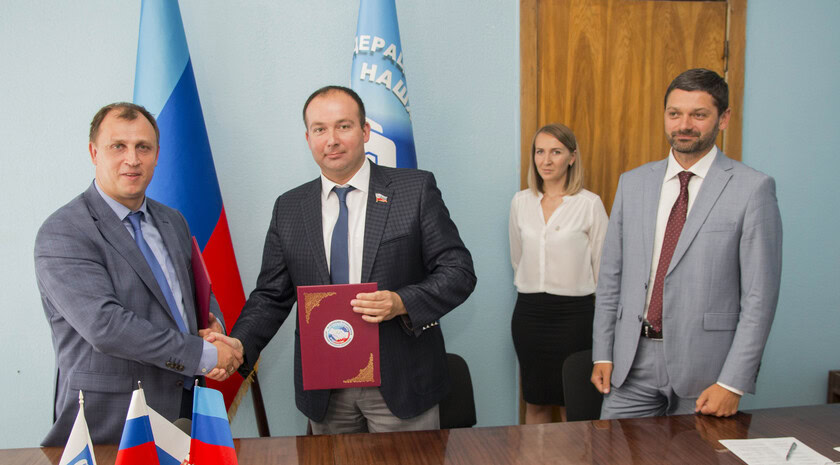
The signing of an agreement on cooperation between the Russian trade union Sotsprof and the “federation of trade unions” of the Luhansk “republic”. In the foreground, from left to right: Sergey Vostretsov, Igor Akimov, coordinator of the “Russia-Donbas Integration Committee” Andrey Kozenko. Photo: occupation administration media outlet
For this purpose, Vostretsov came to Luhansk together with Andriy Kozenko, the coordinator of the “Russia-Donbas Integration Committee”. Both were also members of the Russian State Duma at the time. At a meeting with trade unionists of the Luhansk “republic” Vostretsov said that their organisation even included a trade union of cosmonauts. He promised to send the flags of the trade unions of the Luhansk and Donetsk “republics” into space.
“We will take a photo against the background of the orbit,” Vostretsov said.
The Russian trade union association Sotsprof is registered in St Petersburg. It is positioned as an alternative federation of trade unions, acting as a counterweight to the pro-government unions. Of course, only on paper.
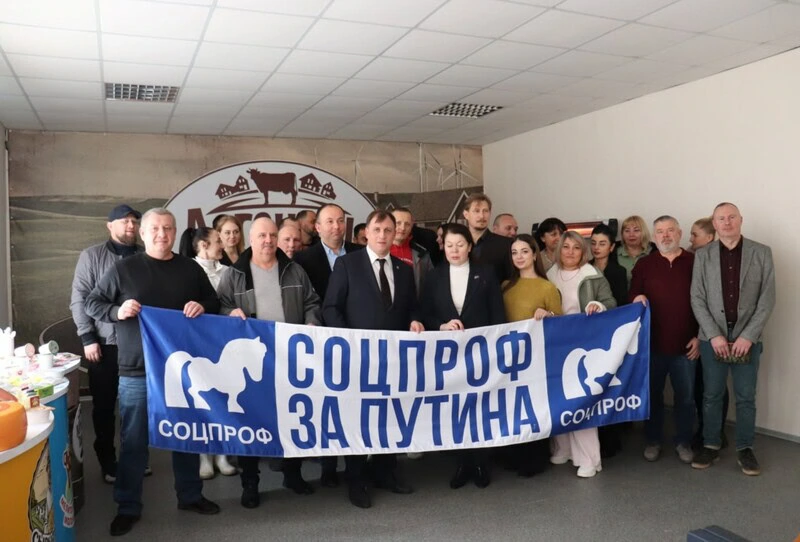
Sergey Vostretsov (centre) during a visit to the occupied part of the Kherson region. Photo: Sotsprof
The head of Sotsprof, Sergei Vostretsov, was a member of the Russian State Duma from 2014 to 2021. He was elected to the parliament from Putin’s United Russia party. Some facts of his biography point to possible cooperation with Russian special services.
In addition to the aforementioned cosmonauts, the union includes two dozen organisations representing students, athletes, dockworkers, workers of oil and gas, mining, chemical, and nuclear industries and even such exotic unions as the migrant workers’ union and the “independent trade union of pensioners”.
A trade union boss with connections to the FSB
Sergei Vostretsov, a graduate of the St Petersburg Military Institute of Internal Troops, worked for more than five years at the St Petersburg University of the Russian Ministry of Internal Affairs. He built his public and political career with the support of his brother Alexei, the head of the press service of the FSB’s St Petersburg and Leningrad Region office. After his service in the security services, Alexei Vostretsov worked as an adviser to Sergei Mironov, Chairman of the Russian Federation Council, until he died in 2004, bringing his brother Sergei along with him.
In 2014, the Sotsprof leader was a confidant of Georgy Poltavchenko, a former KGB officer, in the St Petersburg gubernatorial election. Poltavchenko was the president’s representative in St. Petersburg during Putin’s presidency until 2011 and then served as the city’s acting governor for three years. The election had to be won by all means. Poltavchenko won and, in turn, helped Vostretsov get elected to the State Duma in 2016.
In the Duma, Vostretsov lobbied, among other things, for lowering the age of criminal responsibility to 12 years and for the deprivation of parental rights of those whose children participate in rallies.
Even United Russia’s parteigenosse called the idea of lowering the age of criminal liability to 12 years inadequate. Andrei Turchak, secretary of the party’s general council and vice-speaker of the Federation Council, said it was a sign of professional incompetence and expressed confidence that this would be Vostretsov’s last term in the State Duma. And so it was. But he turned out to be suitable for trade union work, and even more so in the occupied territories.
Oleh Akimov joined the trade union with this leader in 2020. A special position was even created for him – “deputy for work with the regions”. It would have been more appropriate to call it “for work with the new regions” (which is probably what was meant) because, until 2022, his activities were limited to the annexed Crimea and the occupied areas of Donbas, according to publications on the Sotsprof website. Now, the deputy’s area of responsibility has been expanded to include the Kherson and Zaporizhzhia regions.
Under the patronage of a deputy and supervision of a colonel: behind the scenes of propaganda
Since 2017, Oleh Akimov has not only headed the Luhansk “republic” “trade unions”, but has also been an assistant to Russian State Duma deputy Andrey Kozenko, a collaborator from the annexed Crimea. It was he who helped Akimov get a job at Sotsprof, using his acquaintance with Vostretsov and their joint work within the Russian project “Russia-Donbas Integration Committee”.
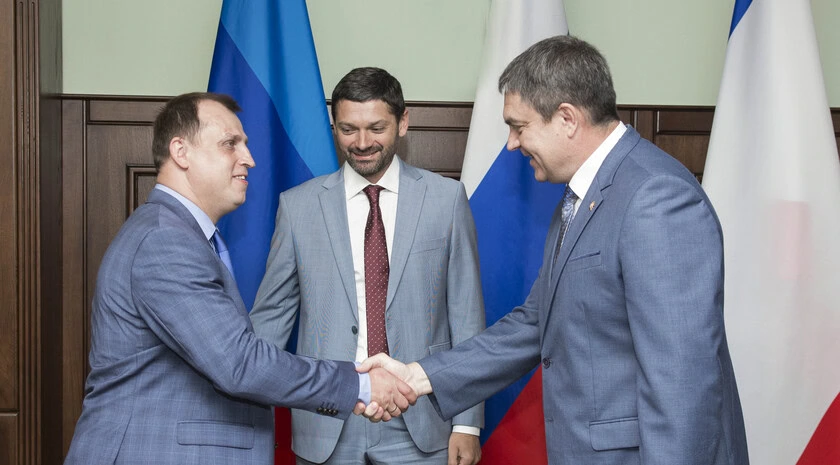
During a visit to the occupation administration of the Luhansk “republic” in August 2019. From left to right: Russian State Duma deputies Sergey Vostretsov, Andriy Kozenko, and head of the “republic” Leonid Pasichnyk. Photo: media outlet of the occupation administration
It is believed that it was Andriy Kozenko who brought his ex-assistant Akimov to work in the occupied part of the Zaporizhzhia region. Since July 2022, Kozenko has been the deputy head of the Russian occupation administration of the region.
On the other hand, both Akimov and Kozenko are not independent figures, they have a common “curator” from the FSB, a Ukrainian counterintelligence officer told Farvater.Skhid on condition of anonymity. According to him, this supervisor is an officer of the FSB Operational Information Department (the 5th Service) with the call sign “Arbat”.
“‘Arbat’ supervised the political direction of the development of the Luhansk ‘republic’ in 2014-2017. At the operational level, he was subordinated to Oleh Akimov, Rodion Miroshnyk (a former director general of the Luhansk regional state television and radio company and a member of the Luhansk regional council, an adviser to the head of the ‘republic’ Igor Plotnitsky from the beginning of the occupation), a group of Crimean propagandists led by Yuriy Pershikov transferred to Luhansk, and so on. And even earlier, he was in touch with Andriy Kozenko, one of the leaders of the Russian community in Crimea and Serhiy Aksyonov’s deputy in the Russian Unity party,” said the officer, who had been working on the “Arbat” group since 2014.
In 2017, Realnaya Gazeta reported on the role of “Arbat” as the FSB propaganda curator in Luhansk. The journalists relied on the hacked correspondence of the Moscow propagandist Vyacheslav Matveev, who was subordinated to “Arbat”. This information coincides with the words of Farvater.Skhid interlocutor.
Recently, Toronto Television investigated “Arbat’s” involvement in the annexation of Crimea and the occupation of the Luhansk region and revealed his real name – Alexander Shingirev.
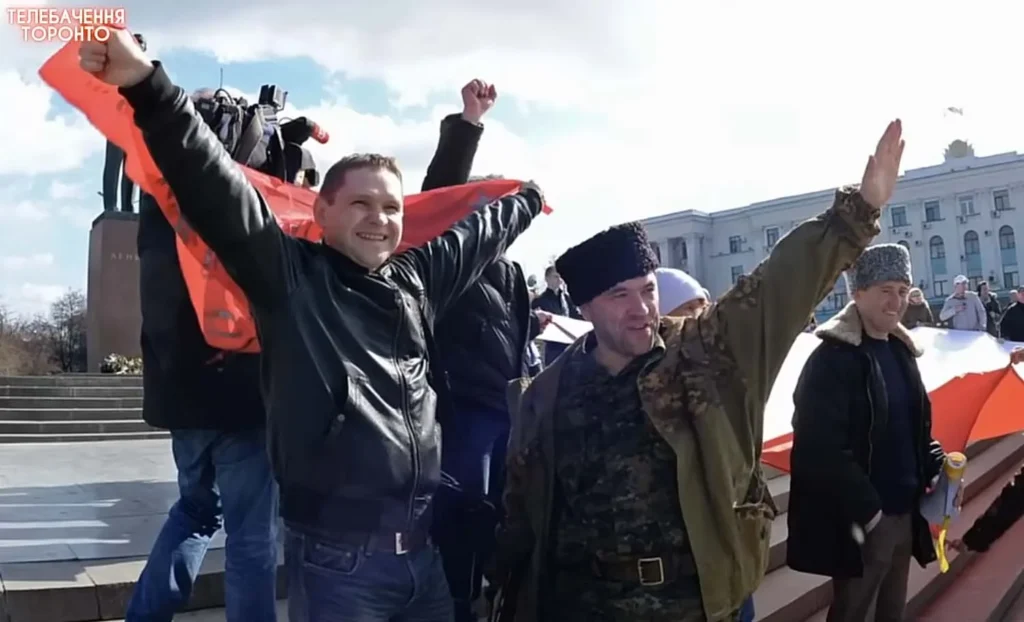
“Arbat”-Shyngirev (left with a flag) and Crimean pro-Russian propagandist Yuriy Pershikov during the celebration of the annexation of Crimea in 2014. Screenshot
Farvater.Skhid also wrote that Oleh Akimov, along with the head of the Luhansk Regional State TV and Radio Company Rodion Miroshnyk, the rector of the Luhansk State Academy of Culture and Arts Valeriy Filipov and several other representatives of local politics, was under the FSB influence, as a veteran of the Luhansk regional SBU office told.
Now, the Ukrainian counterintelligence officer is helping to put the pieces of the puzzle together and put the Akimov in Melitopol phenomenon in context. According to him, “Arbat”, as an experienced “FSB project manager in the occupied territories of Ukraine”, is currently overseeing the Zaporizhzhia direction.
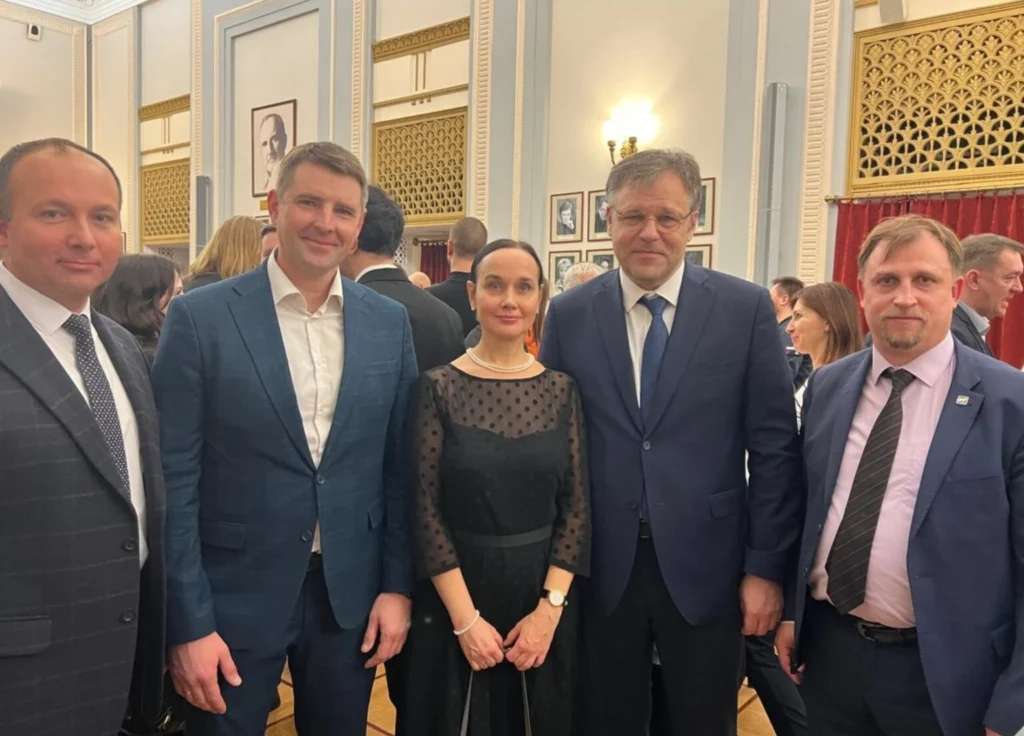
A gala night of an “Integration” club at the Vakhtangov Theatre in Moscow. From left to right: Igor Akimov; “honoured artist” of the Luhansk “republic” Serhiy Chuikov; Rodion Miroshnyk’s wife, former TV presenter Olga Mokhova; Rodion Miroshnyk; Sergei Vostretsov. Photo: “Trudovaya Platforma”
“‘Arbat’s’ functions and tasks are essentially the same as those in the Luhansk region ten years ago. That’s why Akimov, Kozenko, Kochetov and many other of the “old personnel” from his stable popped up in the south. He has assembled a proven team in the Zaporizhzhia region that has already gone through the Crimean and Luhansk ‘special operations’ with him,” the source said.
Thus, today in the occupied part of the Zaporizhzhia region, as in the first years of occupation in the Luhansk region, the FSB is the main actor. Just like then, it uses its old agents to create the appearance of “popular support” for Russia, for example, as it was at one of the turning points of the occupation, during the “nationalisation” of Ukrainian-owned enterprises in 2017. At that time, the leading speakers at the rallies were representatives of “trade unions” led by Oleh Akimov.